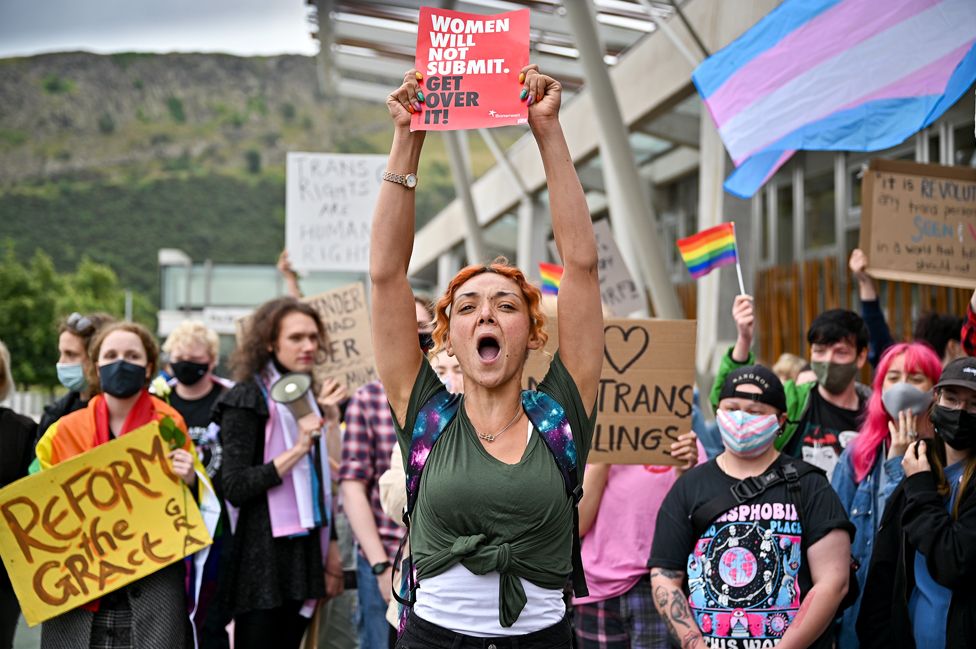How The UK Court's Definition Of "Woman" Could Reshape Sex-Based Rights For Transgender People

Table of Contents
The Legal Battle Over Defining "Woman": A Historical Overview
The legal understanding of "woman" in the UK has evolved significantly. Early legal precedents often relied on a binary understanding of sex, largely ignoring the complexities of gender identity. This often resulted in the exclusion and marginalization of transgender individuals from legal protections.
Early legal precedents and their implications for gender identity:
The lack of clear legal frameworks for gender identity meant transgender individuals frequently faced discrimination and lacked access to essential services. This historical context is crucial in understanding the current legal battles.
- Early cases often centered on marriage and inheritance: Transgender individuals were routinely denied recognition of their gender identity, impacting their legal status and rights.
- Limited legal protection against discrimination: The absence of explicit legal protections left transgender people vulnerable to discrimination in employment, housing, and healthcare.
- The introduction of the Gender Recognition Certificate (GRC): While the GRA aimed to provide legal recognition of acquired gender, it faced criticism for its restrictive criteria and limitations.
The evolution of legal thinking on gender identity reflects broader societal shifts in understanding and acceptance. However, significant challenges remain in achieving full legal equality for transgender people. The interplay between sex discrimination law under the Equality Act 2010 and the complexities of gender identity continues to fuel legal disputes.
The Recent UK Court Ruling and its Implications for Transgender Individuals
Recent court rulings have directly addressed the definition of "woman" and its implications for transgender individuals. These decisions have profound implications across various legal areas.
Detailed explanation of the specific court ruling and its central arguments:
(This section needs to be updated with the specific details of a recent relevant UK court case. For the purpose of this example, a hypothetical ruling is used.) For example, let's say a recent case involved a challenge to a policy excluding transgender women from a women's only space. The court may have ruled that "woman" should be defined based on biological sex assigned at birth, impacting access to such spaces for transgender women.
- Key findings of the judgment: The ruling might prioritize biological sex over gender identity in certain contexts.
- Direct impact on transgender rights: This would potentially limit transgender individuals' access to single-sex spaces and other services designated for women.
- Legal ramifications: The decision sets a legal precedent that could influence future cases involving transgender rights in areas such as employment, healthcare, and sports.
The court's reasoning, its reliance on specific legal interpretations, and its potential broader impact need thorough analysis to understand the full scope of its consequences. Further judicial review and legal challenges are likely to follow.
Potential Impacts on Access to Sex-Based Services and Protection
The UK Court's definition of "woman" significantly impacts access to sex-based services and legal protection for transgender individuals.
Discussion on the impact on access to healthcare (e.g., gender-affirming care):
The definition of "woman" could influence access to healthcare services specifically designed for women.
- Access to gender-affirming care: Legal challenges might arise regarding the provision of healthcare services tailored to transgender individuals.
- Obtaining appropriate medical care: The ruling could complicate access to necessary healthcare services, such as hormone replacement therapy.
Examination of the implications for legal protections against discrimination:
This includes considering the effects on legal cases concerning discrimination based on sex.
- Single-sex spaces: The court's decision could restrict access to single-sex spaces such as changing rooms, bathrooms, and refuges for transgender individuals.
- Legal protection in employment: The interpretation of "woman" may impact protections against sex-based discrimination in the workplace.
- Domestic violence shelters: Access to safe spaces for transgender women experiencing domestic abuse might be affected.
The definition of "woman" fundamentally affects the legal protection against discrimination that transgender individuals may receive.
The Broader Societal Implications and Future Legal Challenges
The court's decision has broad societal and political implications, sparking debates across various sectors.
Analysis of the social and political impact of the court's decision:
The ruling has triggered diverse reactions from various groups.
- Transgender activists: Many are concerned about the potential erosion of their rights and call for legislative changes.
- Women's rights groups: Some groups may support the ruling, citing concerns about the impact of transgender inclusion on women's spaces and services.
- Legal professionals: The decision raises complex legal questions and anticipates further challenges and interpretations.
Discussion of anticipated future legal challenges and the potential for appeals or further legislative action:
The ruling is likely to face legal challenges and appeals.
- Legislative changes: Parliament might consider amending existing laws to clarify the legal definition of "woman" and its implications for transgender rights.
- Public opinion: The debate will continue to shape public opinion and influence future legislative and judicial decisions.
The evolving legal landscape surrounding gender identity and sex-based rights requires ongoing monitoring and analysis.
Conclusion: Navigating the Future of Transgender Rights in the UK: The Ongoing Debate on "Woman"
The UK Court's definition of "woman" has significant implications for transgender individuals' rights and access to services. The ongoing legal and societal debate surrounding this issue highlights the need for ongoing dialogue and careful consideration of the complex interplay between gender identity, sex-based rights, and legal frameworks. This ruling sets a precedent that will undoubtedly shape future legal challenges and policy discussions. It is crucial to follow the evolution of legal interpretations and stay informed about the impact on transgender rights. Stay informed about this crucial issue and follow the ongoing debate on the UK Court's definition of woman and its impact on transgender rights. Learn more by visiting [link to relevant organization 1] and [link to relevant organization 2].

Featured Posts
-
 Effective Natural Strategies For Adhd Symptom Relief
Apr 29, 2025
Effective Natural Strategies For Adhd Symptom Relief
Apr 29, 2025 -
 Analysis Trumps Potential Pardon Of Pete Rose For Baseball Betting
Apr 29, 2025
Analysis Trumps Potential Pardon Of Pete Rose For Baseball Betting
Apr 29, 2025 -
 Resistance Grows Car Dealerships Renew Fight Against Electric Vehicle Regulations
Apr 29, 2025
Resistance Grows Car Dealerships Renew Fight Against Electric Vehicle Regulations
Apr 29, 2025 -
 Austin City Limits Celebrating Willie Nelson And Familys Legacy
Apr 29, 2025
Austin City Limits Celebrating Willie Nelson And Familys Legacy
Apr 29, 2025 -
 Willie Nelsons 4th Of July Picnic Texas Comeback
Apr 29, 2025
Willie Nelsons 4th Of July Picnic Texas Comeback
Apr 29, 2025
Latest Posts
-
 Emergency Response Air Ambulance At Yate Recycling Centre
Apr 30, 2025
Emergency Response Air Ambulance At Yate Recycling Centre
Apr 30, 2025 -
 Hot Deal Alert 14 Adidas Slides During Spring Sale
Apr 30, 2025
Hot Deal Alert 14 Adidas Slides During Spring Sale
Apr 30, 2025 -
 San Diego County Jail Lawsuit Family Alleges Torture And Murder Of Inmate By Cellmate
Apr 30, 2025
San Diego County Jail Lawsuit Family Alleges Torture And Murder Of Inmate By Cellmate
Apr 30, 2025 -
 Akhbar Meashat Abryl 2025 Mwed Alsrf Alrsmy L 13 Mlywn Mwatn
Apr 30, 2025
Akhbar Meashat Abryl 2025 Mwed Alsrf Alrsmy L 13 Mlywn Mwatn
Apr 30, 2025 -
 13 Mlywn Mwatn Yntzrwn Tarykh Srf Meashat Abryl 2025
Apr 30, 2025
13 Mlywn Mwatn Yntzrwn Tarykh Srf Meashat Abryl 2025
Apr 30, 2025
